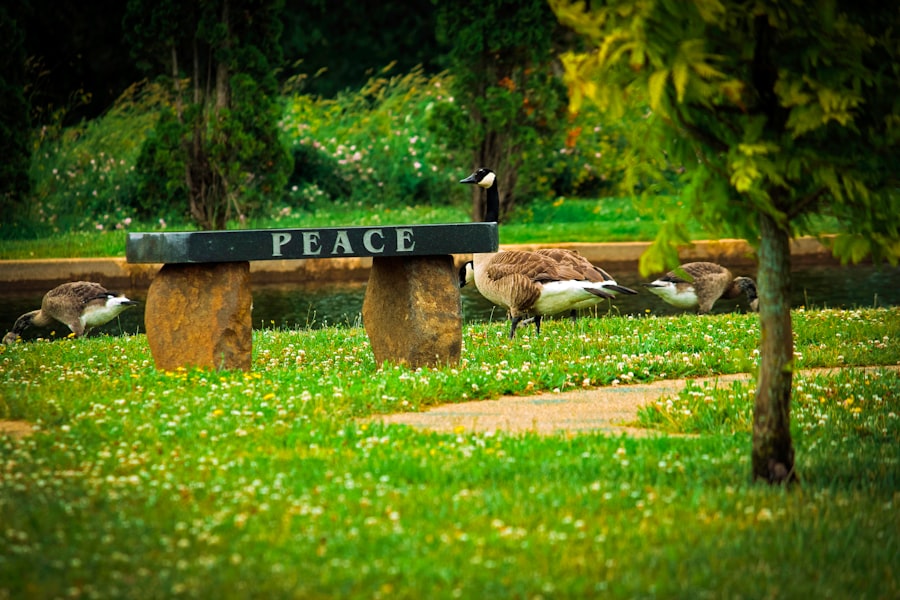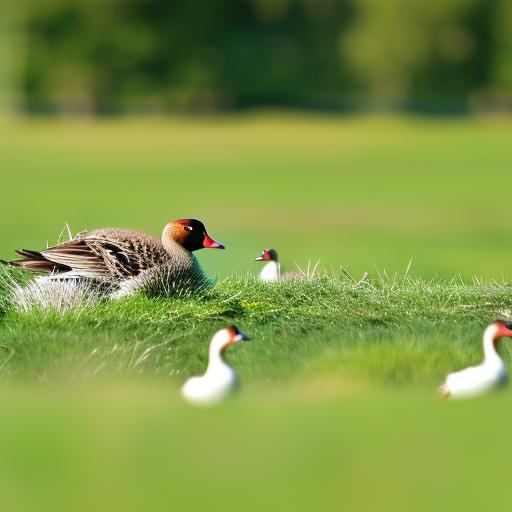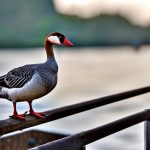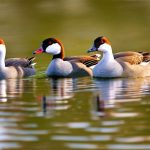Geese on lawns can be a nuisance for many homeowners. These large birds can cause damage to lawns and gardens, and their droppings can pose health risks. In this article, we will explore the negative effects of geese on lawns, as well as ways to keep them off. We will also discuss the legal considerations involved in removing geese from your property.
Key Takeaways
- Geese can cause damage to lawns and pose health risks to humans.
- Geese are attracted to lawns because of the availability of food and water.
- Understanding the behavior of geese can help in deterring them from lawns.
- Natural ways to keep geese off lawns include planting certain types of vegetation and using decoys.
- Physical barriers such as fences and netting, as well as electronic deterrents, can also be effective in keeping geese away.
The negative effects of geese on lawns
Geese can cause significant damage to lawns and gardens. They have a tendency to graze on grass, which can result in patches of bare soil and uneven growth. This can make your lawn look unsightly and reduce its overall health and vitality. Additionally, geese have a habit of pulling up grass with their beaks, further damaging the lawn.
Another issue with geese on lawns is their droppings. Goose droppings are not only unsightly, but they can also pose health risks. They contain bacteria that can contaminate water sources and cause illnesses such as E. coli and salmonella. If you have children or pets who play on the lawn, it is important to keep it free from goose droppings.
Understanding the behavior of geese
To effectively keep geese off your lawn, it is important to understand their behavior. Geese are attracted to lawns because they provide easy access to food and water sources. They are herbivores and feed on grass, so a well-maintained lawn is like a buffet for them. Geese also prefer open spaces where they can easily spot predators.
Geese have nesting and migration patterns that can affect their presence on your lawn. During nesting season, which typically occurs in the spring, geese become more territorial and aggressive. They may choose to nest near bodies of water, such as ponds or lakes, which are often found in residential areas. Additionally, geese migrate in large flocks, so if your property is located along their migration route, you may experience an influx of geese during certain times of the year.
Natural ways to keep geese off lawns
There are several natural deterrents that can help keep geese off your lawn. One option is to plant tall grasses or shrubs around the perimeter of your property. Geese prefer open spaces where they can easily spot predators, so creating barriers with vegetation can discourage them from entering your lawn.
Another natural deterrent is the use of decoys. Geese are social animals and are less likely to settle in an area where they see other geese. Place decoys, such as plastic geese or herding dogs, on your lawn to create the illusion of a populated area and deter geese from landing.
Maintaining a clean lawn is also important in deterring geese. Remove any fallen fruit or seeds from trees and regularly clean up any goose droppings. Geese are attracted to areas with a ready food source, so keeping your lawn free from debris can help discourage them from settling.
Physical barriers to keep geese away
Physical barriers can be an effective way to keep geese off your lawn. Fences and netting can create a physical barrier that prevents geese from accessing your property. Choose a fence that is at least three feet tall and has small gaps between the slats to prevent geese from squeezing through.
Netting can be used to cover ponds or other bodies of water on your property. Geese are attracted to water sources for both drinking and nesting, so covering these areas with netting can make them less appealing to geese.
It is important to regularly inspect and maintain these physical barriers to ensure their effectiveness. Repair any holes or gaps in fences or netting promptly to prevent geese from finding a way in.
Electronic deterrents for geese

Electronic deterrents can be an effective way to keep geese off your lawn. These devices use noise or motion sensors to scare away geese. Noise makers, such as sirens or ultrasonic devices, emit loud sounds that startle geese and discourage them from landing.
Motion sensor devices use infrared technology to detect the presence of geese and activate a deterrent, such as a sprinkler system or flashing lights. These sudden movements and changes in the environment can scare geese away.
While electronic deterrents can be effective, they may also have limitations. Geese can become habituated to certain sounds or movements over time, so it is important to regularly change the settings or patterns of these devices to maintain their effectiveness.
The role of landscaping in deterring geese
Landscaping choices can play a significant role in deterring geese from your lawn. Geese prefer open spaces where they can easily spot predators, so creating barriers with landscaping features can discourage them from settling.
Choose plants that are unpalatable to geese, such as ornamental grasses or prickly shrubs. These plants have textures or tastes that geese find unappealing and are less likely to graze on.
Design your lawn with features that make it less attractive to geese. For example, create slopes or mounds in your lawn that make it difficult for geese to walk on. Geese prefer flat surfaces where they can easily graze, so creating uneven terrain can deter them from landing.
Working with professionals to keep geese off lawns
In some cases, it may be necessary to hire a professional to help with goose control. Professionals have the knowledge and experience to effectively deter geese and prevent them from returning to your property.
When hiring a professional, it is important to do your research and find a reputable company. Look for companies that specialize in wildlife management and have experience dealing with geese. Ask for references and read reviews to ensure you are hiring a reliable and trustworthy professional.
Legal considerations for removing geese
Before taking any action to remove geese from your property, it is important to consider the legal implications. Geese are protected under federal law, so it is illegal to harm or kill them without the proper permits.
However, there are legal methods for deterring geese from your property. These include using natural deterrents, physical barriers, and electronic devices. It is important to familiarize yourself with local laws and regulations regarding goose control to ensure you are in compliance.
Conclusion and tips for maintaining a goose-free lawn
In conclusion, geese on lawns can be a nuisance for homeowners. They can cause damage to lawns and gardens, and their droppings can pose health risks. Understanding the behavior of geese and implementing deterrents can help keep them off your property.
Maintaining a clean lawn, using natural deterrents, installing physical barriers, and utilizing electronic devices can all be effective ways to deter geese. Landscaping choices can also play a role in deterring geese from your lawn.
If necessary, hiring a professional can provide additional assistance in goose control. However, it is important to comply with local laws and regulations when removing geese from your property.
By implementing these strategies and regularly maintaining your lawn, you can enjoy a goose-free environment. Share your own tips and experiences in the comments below!
If you’re looking for effective ways to keep geese off your lawn, you might also be interested in learning about how to create a safe and comfortable living space for your chickens. Poultry Wizard offers a helpful article on building a chicken coop in Grand Island, NE, which provides valuable insights into designing a coop that meets the needs of your feathered friends. Check out their article here to discover tips and tricks for creating a cozy home for your chickens.
FAQs
What are some effective ways to keep geese off lawns?
There are several effective ways to keep geese off lawns, including using decoys, installing fencing, using repellents, and modifying the landscape.
What are some natural repellents that can be used to keep geese away?
Some natural repellents that can be used to keep geese away include planting tall grasses, using predator urine, and using reflective tape or balloons.
What are some common mistakes people make when trying to keep geese off their lawns?
Some common mistakes people make when trying to keep geese off their lawns include using ineffective or outdated methods, not being consistent with their efforts, and not addressing the root cause of the problem.
Why is it important to keep geese off lawns?
It is important to keep geese off lawns because they can cause damage to the landscape, create unsanitary conditions, and pose a safety risk to people and pets.
What are some long-term solutions for keeping geese off lawns?
Some long-term solutions for keeping geese off lawns include modifying the landscape to make it less attractive to geese, using habitat modification techniques, and implementing a comprehensive management plan.
Meet Walter, the feathered-friend fanatic of Florida! Nestled in the sunshine state, Walter struts through life with his feathered companions, clucking his way to happiness. With a coop that’s fancier than a five-star hotel, he’s the Don Juan of the chicken world. When he’s not teaching his hens to do the cha-cha, you’ll find him in a heated debate with his prized rooster, Sir Clucks-a-Lot. Walter’s poultry passion is no yolk; he’s the sunny-side-up guy you never knew you needed in your flock of friends!







